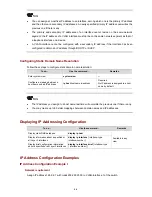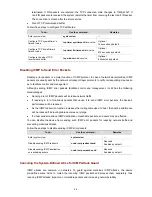
Setting the Voice Traffic Transmission Priority
In order to improve transmission quality of voice traffic, the switch by default re-marks the priority of the
traffic in the voice VLAN as follows:
z
Set the CoS (802.1p) priority to 6.
Confi
r
A po
You
the
Proce
VLAN by learning the source MAC address in the
untagged packet sent by the IP voice device when it is powered on. The voice VLAN uses the aging
When the aging timer expires, the
e, ports can not be added to or removed
from a voice VLAN manually.
Manual voice VLAN assignment mode: In this mode, you need to add a port to a voice VLAN or
ort from a voice VLAN manually.
Processing mode of tagged packets sent by IP voice devices
z
Set the DSCP value to 46.
gu ing Voice VLAN Assignment Mode of a Port
rt can work in automatic voice VLAN assignment mode or manual voice VLAN assignment mode.
can configure the voice VLAN assignment mode for a port according to data traffic passing through
port.
ssing mode of untagged packets sent by IP voice devices
z
Automatic voice VLAN assignment mode. A Switch 4500 Ethernet switch automatically adds a port
connecting an IP voice device to the voice
mechanism to maintain the number of ports in the voice VLAN.
ports whose OUI addresses are not updated (that is, no voice traffic passes) will be removed from
the voice VLAN. In voice VLAN assignment automatic mod
z
remove a p
Tagged packets from IP voice devices are forwarded based on their tagged VLAN IDs, whether the
automatic or manual voice VLAN assignment mode is used.
If the voice traffic transmitted by an IP voice device carries VLAN tags, and 802.1x authentication and
guest VLAN is enabled on the port which the IP voice device is connected to, assign different VLAN IDs
for the voice VLAN, the default VLAN of the port, and the 802.1x guest VLAN to ensure the effective
operation of these functions.
Support for Voice VLAN on Various Ports
Voice VLAN packets can be forwarded by access ports, trunk ports, and hybrid ports. You can enable a
trunk or hybrid port belonging to other VLANs to forward voice and service packets simultaneously by
enabling the voice VLAN.
For different types of IP phones, the support for voice VLAN varies with port types and port configuration.
For IP phones capable of acquiring IP address and voice VLAN automatically, the support for voice
VLAN is described in
Table 10-2
.
10-4
















































